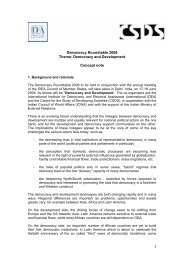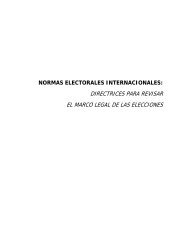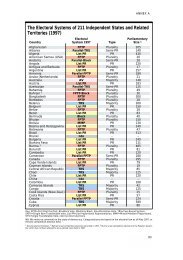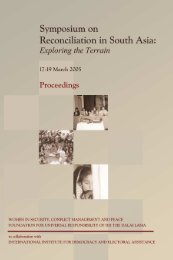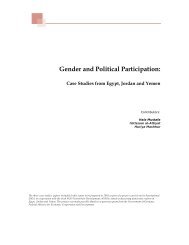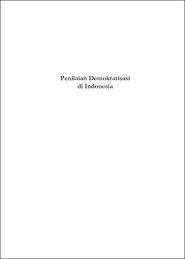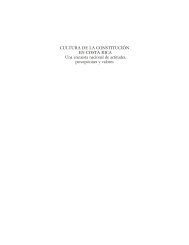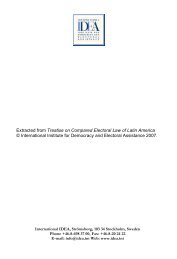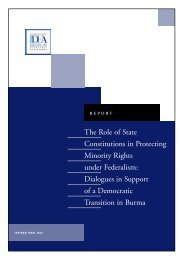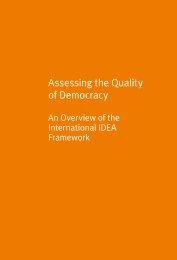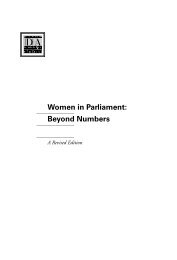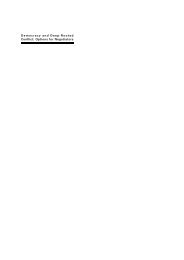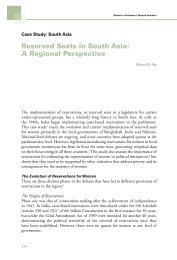International IDEA Gender Policy
International IDEA Gender Policy
International IDEA Gender Policy
Create successful ePaper yourself
Turn your PDF publications into a flip-book with our unique Google optimized e-Paper software.
<strong>International</strong> <strong>IDEA</strong> <strong>Gender</strong> <strong>Policy</strong><br />
The Secretary General’s Statement on <strong>IDEA</strong> <strong>Gender</strong> <strong>Policy</strong><br />
The objective of achieving gender equality is indivisible from the <strong>International</strong> <strong>IDEA</strong> goal of sustainable<br />
democracy worldwide, hence <strong>International</strong> <strong>IDEA</strong>’s commitment to making gender equality a reality.<br />
<strong>International</strong> <strong>IDEA</strong> will leverage for the transformation of power relations between men and women in<br />
such a manner that gender equality is promoted in terms of inclusiveness, participation,<br />
representativeness and accountability of democratic processes to both women and men.<br />
As equality between women and men is a key feature of democracy, gender, as a cross-cutting issue<br />
must be addressed in all our internal systems and practices and areas of work, especially in<br />
programmes whose primary focus is not on gender.<br />
For <strong>International</strong> <strong>IDEA</strong> to move from rhetoric to reality, commitment is needed throughout the<br />
organisation in terms of the programme areas and internal management practices. Therefore, I urge<br />
all colleagues to dedicate full attention to this sought after objective and to translate the <strong>Gender</strong> <strong>Policy</strong><br />
into substantive results. The commitments and efforts towards gender equality will also be enhanced<br />
by placing gender at the heart of the <strong>International</strong> <strong>IDEA</strong> Strategy, Programme of Operations and<br />
equally important within the internal management systems and practices.<br />
Experience has taught us that the objective of gender equality requires active leadership and<br />
advocacy by senior management backed by accountability mechanisms and allocation of sufficient<br />
resources. I take this opportunity to reiterate my unwavering commitment towards gender equality and<br />
to keeping gender at the top of <strong>International</strong> <strong>IDEA</strong>’s management/administrative systems and<br />
international democracy agenda. I also expect senior management and staff to be fully accountable to<br />
me on progress made in this area.<br />
As democracy building itself, the attainment of gender equality is a long process that requires<br />
commitment, participation and contribution of every staff member. We will also require the cooperation<br />
and support of our Member States and partners at national, regional and international levels.<br />
It is no longer the ‘why’ but the 'how' of gender work that needs to be addressed to make it a practical<br />
reality. <strong>Gender</strong> equality work will now be part of our day to day political and administrative work.<br />
Rather than an add-on, gender equality must be an integral part of all our efforts in order to ensure<br />
that our own internal practices and global work on democracy building does not perpetuate the already<br />
existing gender inequalities.<br />
Building a common understanding on gender in the organization through capacity and knowledge<br />
development on gender concerns and gender analysis will be one of the core areas for staff<br />
competencies strengthening.<br />
This <strong>Gender</strong> <strong>Policy</strong> provides an institutional framework for placing gender at the centre of all our work<br />
through an approach that ensures greater consistency and coherence on gender equality principles<br />
and practices across the organisation, in other words “walking the talk”.<br />
Vidar Helgesen<br />
Secretary-General, 2009<br />
<strong>International</strong> <strong>IDEA</strong> <strong>Gender</strong> <strong>Policy</strong> 1<br />
November 2009
Glossary of terms<br />
<strong>Gender</strong> refers to socially constructed rather than biologically determined roles of women and men, as<br />
well as the relationships between them in a given society at a specific time and place, while sex refers<br />
to the biologically determined difference and roles. The qualities, identities and behaviors expected<br />
from men and women are determined through the process of socialisation.<br />
<strong>Gender</strong> is an analytical category comparable to race, class, ethnicity, religious background etc. and it<br />
should be used in a similar way as analytical tool. Just as race, class, ethnicity, religion and culture,<br />
gender constituted and still constitutes a basis for oppression and discrimination among individuals;<br />
the term gender captures a frequently invoked reason for inequalities between women and men, boys<br />
and girls.<br />
<strong>Gender</strong> is often overlooked as an aspect of men’s social identity, yet the lives and activities of men as<br />
well as women are strongly influenced by gender. In most societies, men tend to have broader<br />
options, more opportunities and greater access to society’s resources than women. This is the result<br />
of a framework of legislation, policies, and institutions that incorporate attitudes and practices about<br />
what is appropriate to being male and female in a given society.<br />
<strong>Gender</strong> Analysis entails the examination and identification of processes of how, in a given context,<br />
relations between men and women are shaped and the various needs and experiences of each<br />
gender. The analysis is to be informed by how gender is also intertwined with and affected by other<br />
identities and realities such as ethnicity, class, race, religion, disability, culture. This makes gender a<br />
cross-cutting issue to be addressed through a mainstreaming strategy.<br />
<strong>Gender</strong> equality entails that women and men enjoy the same status, have equal conditions for<br />
realizing their full human rights and potential to contribute to national, political, social, cultural and<br />
economic development and to benefit from the results. It is therefore the equal valuing by society of<br />
both the similarities and differences men and women and the varying roles they perform.<br />
<strong>Gender</strong> equity is the process through which leads to equality by seeking to overcome historical and<br />
social disadvantages that prevent women and men from enjoying a level playing field in different<br />
spheres of life.<br />
<strong>Gender</strong> mainstreaming is a strategy of ensuring that both women and men benefit from <strong>IDEA</strong><br />
support and work, reflecting the understanding that equality is both a means and an end. <strong>Gender</strong><br />
mainstreaming requires a focus on actual results in terms of gender equality in the areas of work at<br />
different levels. It is:<br />
“The process of assessing the implications for women and men of any planned action, including<br />
legislation, policies or programmes . . . making women’s as well as men’s concerns and experiences<br />
an integral dimension of the design, implementation, monitoring and evaluation of policies and<br />
programmes in all political, economic and societal spheres so that women and men benefit equally<br />
and inequality is not perpetuated.” Economic and Social Council, 1997.<br />
<strong>Gender</strong> mainstreaming requires a shift in the understanding of how social structures and processes<br />
recreate and perpetuate inequalities between women and men in accessing resources, taking<br />
advantage of opportunities and participating in decision-making.<br />
Equality of Outcome: Because of their different positions in society, women and men may not be<br />
able to take advantage of equal opportunities to the same extent. In some cases equal opportunities<br />
can actually have a negative impact on women’s well-being, if women exert time and energy to take<br />
advantage of them with no result. In order to ensure that interventions result in equality of outcome for<br />
women and men, it is necessary to design them on the basis of gender analysis. “Equal” treatment<br />
therefore does not mean “the same” treatment.<br />
Practical <strong>Gender</strong> and Strategic <strong>Gender</strong> Interests/Needs: Women and men have different roles and<br />
responsibilities and therefore have different interests/needs. These are called gender interests/needs,<br />
practical and strategic. Practical and strategic gender interests/needs should not be seen as separate,<br />
but rather as a continuum. Responsiveness to women on their practical gender interests/needs an<br />
entry point to address gender inequalities in the longer term (strategic gender interests/needs) can be<br />
created.<br />
<strong>International</strong> <strong>IDEA</strong> <strong>Gender</strong> <strong>Policy</strong> 2<br />
November 2009
1. Introduction<br />
<strong>International</strong> <strong>IDEA</strong> has defined gender 1 equality as an important strategic objective within its<br />
management practices and work to support sustainable democratic change through the<br />
provision of comparative knowledge, assisting in democratic reforms and influencing policy<br />
and politics.<br />
<strong>International</strong> <strong>IDEA</strong> recognises that the intersection between democracy and gender is of<br />
profound importance to sustainable democracy as gender equality is not only an important<br />
goal in its own right, but is vital to democracy and a strong gender perspective is therefore<br />
critical in <strong>IDEA</strong>’s work aimed at democracy building.<br />
<strong>International</strong> <strong>IDEA</strong> has increasingly made efforts to work with a gender perspective over the<br />
years. The experience gained and lessons learnt through the efforts to implement the 2002-<br />
2005 <strong>Gender</strong> Equality <strong>Policy</strong> has strengthened our resolve and taught us that gender<br />
equality objectives are not self implementing.<br />
Of particular importance are the findings and recommendations of the Evaluation 2 of the<br />
Women in Politics Project (2000–2005) and <strong>Gender</strong> Mainstreaming (2002–2005) which was<br />
concluded in September 2006. The evaluation highlights the following;<br />
• The Action Plan, which would have guided the implementation of the <strong>Gender</strong><br />
Equality <strong>Policy</strong> was never developed;<br />
• No human or financial resources were allocated to develop or implement a<br />
<strong>Gender</strong> Action Plan<br />
• A lack of systematised processes that require gender to be integrated into<br />
programmes and ensure that management practices are implemented with<br />
gender equity;<br />
• A lack of tools or support mechanisms that would serve as “reminders” to<br />
mainstream gender;<br />
• Other competing priorities<br />
• In some cases, a lack of understanding or expertise amongst staff of how to<br />
mainstream gender.<br />
Hence, this <strong>Gender</strong> <strong>Policy</strong> is a product of insights gained through <strong>International</strong> <strong>IDEA</strong>’s work<br />
experience in democracy building, internal management and administrative practices<br />
assessment/evaluation. The need to retain and strengthen the work to integrate gender<br />
equality considerations in <strong>International</strong> <strong>IDEA</strong>’s internal management systems and in the<br />
regional and global programmes cannot be over emphasised.<br />
<strong>International</strong> <strong>IDEA</strong>’s thinking has evolved, and this policy is grounded in the premise that, the<br />
democracy objective for inclusiveness and representativeness requires policies and practices<br />
which deconstruct and transform unequal gender relations. The <strong>Gender</strong> <strong>Policy</strong> is one tool to<br />
make this a reality by ensuring that gender objectives, indicators 3 , outcomes and<br />
performance targets are set within the organisation’s Results Based Management system.<br />
This policy presents <strong>International</strong> <strong>IDEA</strong>’s approach to place gender equality at the centre of<br />
its management and communications systems and programmes on democracy building. To<br />
have an impact, gender mainstreaming must be everyone’s responsibility and this policy<br />
provides the guidelines on the responsibility of the different parts of the organization.<br />
1 See the glossary of terms<br />
2 Evaluation of the <strong>International</strong> <strong>IDEA</strong>’s Women in Politics Project (2000-2005) and <strong>Gender</strong> Mainstreaming (2002-2005),<br />
September 27, 2006, page 2.<br />
3 What gets measured gets done<br />
<strong>International</strong> <strong>IDEA</strong> <strong>Gender</strong> <strong>Policy</strong> 3<br />
November 2009
For <strong>International</strong> <strong>IDEA</strong> this means that formulating policies and programmes that promote<br />
women is not enough; the aim is to strive for the equal distribution of power and influence<br />
between women and men as a pillar for democracy.<br />
Overall, the approach entails involving and engaging both men and women in the democracy<br />
and gender discourse in order to facilitate conditions and opportunities for women and men<br />
to participate fully in social, political and economic processes. The focus is on gender<br />
equality as an objective, which means going beyond the question, “How many women<br />
participated?” to a quest for substantive transformation and outcomes; “How <strong>International</strong><br />
<strong>IDEA</strong> interventions/work can reduce disparities between women and men?”<br />
2. The Mandate<br />
<strong>International</strong>ly, advances in the pursuit of gender equality are evident through the<br />
development and adoption of landmark inter-governmental agreements and comprehensive<br />
frameworks. From the Universal Declaration of Human Rights to the Convention on the<br />
Elimination of All Forms of Discrimination against Women (CEDAW), the Beijing Declaration<br />
and Platform for Action (BPFA) and the UN Millennium Development Goals (MDGs),<br />
commitments and obligations to achieve address gender inequalities are articulated:<br />
“. . . the achievement of equality between women and men are a matter of human rights and<br />
a condition for social justice and should not be seen in isolation as a women's issue. They<br />
are the only way to build a sustainable, just and developed society. Empowerment of women<br />
and equality between women and men are prerequisites for achieving political, social,<br />
economic, cultural and environmental security among all peoples.”<br />
Beijing Platform of Action, Fourth United Nations World Conference on Women, Beijing,<br />
1995.<br />
Although important milestones have been reached and some progress has been achieved<br />
towards gender equality, much remains to be done. <strong>International</strong> <strong>IDEA</strong> must contribute<br />
towards translating these commitments into realities through its operational programmes<br />
focusing on comparative knowledge, assisting in reform and influencing policies and politics.<br />
Over the years the growing knowledge on the status of women and men, raising of women’s<br />
political awareness, empowerment and collective action, have contributed to promoting<br />
gender equality.<br />
As <strong>International</strong> <strong>IDEA</strong> continues to confront these challenges, it must uphold the principle<br />
and encourage the understanding that there is no sound and sustainable democracy without<br />
equal power relations between men and women. Equally important, is the conviction that<br />
building democracy requires the active involvement and ownership of processes by both<br />
women and men, who are not homogenous groups but their gender is intertwined with other<br />
identities and realities such as ethnicity, class, race, religion, disability, culture.<br />
Commitment to achieving gender equality will be an important criterion for partnerships and<br />
collaboration and <strong>International</strong> <strong>IDEA</strong> will work to encourage member states and democracy<br />
community partners with which we work to contribute towards the achievement of gender<br />
equality. <strong>International</strong> <strong>IDEA</strong> will be in the forefront and continue to participate actively in<br />
partnerships and networks on advocacy and support for gender equality and women’s<br />
empowerment.<br />
3. <strong>Policy</strong> Commitment<br />
3.1 Goal<br />
The goal of the <strong>Gender</strong> <strong>Policy</strong> is to promote gender equality and ensure that <strong>International</strong><br />
<strong>IDEA</strong>’s internal management systems and practices and work on supporting sustainable<br />
<strong>International</strong> <strong>IDEA</strong> <strong>Gender</strong> <strong>Policy</strong> 4<br />
November 2009
democracy through the provision of comparative knowledge, assistance in reform and<br />
influencing policies and politics help to overcome inequalities between men and women.<br />
3.2 Objectives<br />
The objectives are to:<br />
• ensure that the <strong>International</strong> <strong>IDEA</strong> Strategy, policies, management systems/practices<br />
and programmes are gender sensitive and responsive;<br />
• promote the adoption of policies and practices that address the equal distribution of<br />
power and influence between men and women in shaping sustainable democratic<br />
processes, institutions and outcomes;<br />
• ensure that gender equality objectives and indicators are reflected in staff objectives<br />
and results, performance assessments, management and administration systems.<br />
4. Operational Strategy<br />
4.1 <strong>Gender</strong> mainstreaming and women’s empowerment<br />
As a cross cutting dimension of democracy, gender must underpin all <strong>International</strong> <strong>IDEA</strong><br />
management practices and programme areas of work. <strong>Gender</strong> will be addressed through two<br />
complementary and critical approaches; gender mainstreaming and women’s empowerment.<br />
<strong>Gender</strong> mainstreaming is a strategy for enhancing gender responsive management practices<br />
and programming which benefits both women and men through <strong>International</strong> <strong>IDEA</strong>’s work. It<br />
is intended to be transformative and a consistent part of all that <strong>International</strong> <strong>IDEA</strong> does by<br />
targeting both sexes.<br />
It requires increased accountability for gender equality results in management practices and<br />
programming areas in terms of showing the benefits to both men and women. It is:<br />
“The process of assessing the implications for women and men of any planned action,<br />
including legislation, policies or programmes . . . making women’s as well as men’s concerns<br />
and experiences an integral dimension of the design, implementation, monitoring and<br />
evaluation of policies and programmes in all political, economic and societal spheres so that<br />
women and men benefit equally and inequality is not perpetuated” Economic and Social<br />
Council, 1997.<br />
Women’s empowerment is a strategy of targeted actions aimed at empowering women and<br />
righting gender inequalities in the social, political and economic spheres. This is a concept<br />
and approach that <strong>IDEA</strong> has long believed in. Focus on women’s political empowerment and<br />
mobilization will be undertaken alongside efforts to mainstream gender within the institutional<br />
mechanisms and work on democracy.<br />
4.2 Institutional Arrangements<br />
The Secretary General’s Action Plan on <strong>Gender</strong> will be developed to provide the overall<br />
institutional arrangements, accountability mechanisms, results and appropriate resources.<br />
Senior management (Secretary General and Directors) are responsible for the active<br />
leadership and advocacy on gender equality and this is to be backed by meaningful gender<br />
responsive practices and communication.<br />
Senior management is to ensure that management and administrative systems are changed<br />
and that programme implementation work plans define gender equality objectives and<br />
indicators for performance, which are to be monitored through the institutional Results Based<br />
Management (RBM) framework.<br />
<strong>International</strong> <strong>IDEA</strong> <strong>Gender</strong> <strong>Policy</strong> 5<br />
November 2009
All staff are the bearers of the organisational culture, hence it is an imperative that all staff<br />
are sufficiently aware and self-critical in order to step out of a counter-productive culture and<br />
embrace gender values, attitudes and practices. The organisational collaboration and<br />
change processes in the context of the Organisational Change training facilitates an<br />
appropriate environment in view of the required attitudinal changes and consequences<br />
implied by the policy.<br />
4.3 Programming (Global and Regional)<br />
Programming in line with the principles of results based management will entail the<br />
integration of explicit gender objectives, outcomes/results to prevent and reduce inequalities<br />
between men and women in the non gender specific programme areas of work. The<br />
Programme of Operations is to inform the definition of gender specific objectives in the<br />
designing, planning and implementation of programme activities with clear gender indicators<br />
for monitoring and performance accountability.<br />
Senior management and senior staff (strategy and policy, programming and administrative)<br />
will be required to report on their documented responsibilities and accountabilities for gender<br />
equality results in programme activities, strategy and policy and institutional arrangements<br />
within their respective mandates.<br />
Attention will be paid to the responsibilities on the following;<br />
• Management and administrative systems on accountability for gender targets in<br />
institutional practices;<br />
• Inclusion of gender equality aspects/dimensions in the development of substantive<br />
themes/ agendas of programme activities;<br />
• Equal opportunities for women and men to participate and benefit from the<br />
programmes’ seminars, meetings, workshops and knowledge resources;<br />
• Tracking programming progress towards the set gender equality results/outcomes.<br />
To underpin the <strong>International</strong> <strong>IDEA</strong> approach the Democracy and <strong>Gender</strong> Programme was<br />
established to spearhead gender integration and women’s empowerment in democracy<br />
building. The programme focus on Democracy and <strong>Gender</strong> will enable <strong>International</strong> <strong>IDEA</strong> to:<br />
• Programme its work in a way that addresses gender inequalities in democracy<br />
including targeted measures to support the political empowerment of women;<br />
• Ensure that gender equality considerations are integrated and reflected in non-gender<br />
specific areas of work where gender is relevant;<br />
• Ensure the tracking on gender in the implementation of policy and<br />
management/administrative systems.<br />
An external <strong>Gender</strong> Advisory Group will be established to enhance the expertise and<br />
technical backstopping for <strong>International</strong> <strong>IDEA</strong>’s work on democracy building from a gender<br />
perspective.<br />
The group will serve as an advisory “think tank” on gender to the Secretary General and<br />
provide timely or relevant gender specific research in the field of democracy in order to<br />
strengthen the institutional capacity in gender analysis and mainstreaming.<br />
4.4 Human Resources and Administration<br />
With the backing and support services of the Human Resources office, <strong>International</strong> <strong>IDEA</strong><br />
will pursue to achieve gender parity and diversity in human resources management and<br />
administrative practices. The challenge is deeper than numbers and therefore long term<br />
parity will require profound cultural, policy and technical capacities improvements in<br />
<strong>International</strong> <strong>IDEA</strong>.<br />
i. Staff Policies: <strong>International</strong> <strong>IDEA</strong> staff policies and practices, rules and regulations to<br />
be comprehensive in stipulating the gender equality commitments of the organisation.<br />
<strong>International</strong> <strong>IDEA</strong> <strong>Gender</strong> <strong>Policy</strong> 6<br />
November 2009
Decision making processes in <strong>International</strong> <strong>IDEA</strong> are to reflect equal opportunities for<br />
men and women at the different levels.<br />
ii.<br />
iii.<br />
<strong>Gender</strong> Parity: <strong>International</strong> <strong>IDEA</strong> will pursue the achievement of 50/50 gender ratio<br />
of staff at all levels by 2012. Tracking of the gender profile of <strong>International</strong> <strong>IDEA</strong>’s<br />
workforce will be undertaken continuously to ensure that men or women are not more<br />
than 60percent at the different levels of the organisation including at senior<br />
management level.<br />
Employment and Recruitment: With the backing and support services of the Human<br />
Resources office, <strong>International</strong> <strong>IDEA</strong> will work towards gender balance in staffing at<br />
all levels and positions including staff at senior management and consultants.<br />
A far reaching gender sensitive recruitment policy where preference will be given to<br />
equally qualified and competent men and women in appointments to positions where<br />
there are gender and diversity imbalances.<br />
Senior management and senior staff (strategy and policy, programming and<br />
administrative) are responsible and accountable for progress towards gender parity in<br />
their respective units/departments by ensuring that;<br />
• Job descriptions and job advertisements incorporate responsibilities/functions<br />
on gender and highlight the knowledge and experience on gender as an asset<br />
for applicants;<br />
• Terms of Reference for external consultants will specify the responsibility to<br />
incorporate gender aspects in assignments undertaken for <strong>International</strong> <strong>IDEA</strong>.<br />
All interviews for staff recruitment will have women and men on the interview panels<br />
and gender related questions are to be integrated into interviews for all positions.<br />
Human Resources is responsible for ensuring that all new staff joining <strong>International</strong><br />
<strong>IDEA</strong> are oriented to the <strong>Gender</strong> <strong>Policy</strong> and their responsibilities on gender<br />
mainstreaming within the organization.<br />
iv.<br />
Remuneration: <strong>International</strong> <strong>IDEA</strong> will uphold the policy on equal pay for equal work<br />
and objective valuing of posts regardless of gender or otherwise. The<br />
salary/compensation system and contract modalities must be standardized and<br />
administered transparently to ensure and support equitable application (gender or<br />
otherwise).<br />
A transparent classification system and salary/compensation matrix that shows the<br />
grades/levels, job titles, minimum experience, expertise and skills, compensation,<br />
benefits/allowances between women and men at the different levels is to be<br />
developed and in place by 2010.<br />
v. Capacity and knowledge development: the support and facilitation of learning and<br />
knowledge based sharing on gender equality will be prioritized to ensure that staff<br />
capacity in gender awareness and gender mainstreaming is actively developed to<br />
enhance the understanding of its intersection with democracy and increase staff’s<br />
understanding of their own responsibility to mainstream gender.<br />
vi.<br />
Performance Reviews and Appraisals: Human Resources is responsible for<br />
ensuring that the performance appraisal system is changed to enable yearly<br />
appraisals on gender equality performance, including monitoring senior management<br />
performance.<br />
<strong>International</strong> <strong>IDEA</strong> <strong>Gender</strong> <strong>Policy</strong> 7<br />
November 2009
Senior management and line managers are to ensure that results and competency<br />
assessments of each staff member take into account performance on gender<br />
equality.<br />
This requires that gender indicators developed and elaborated in programme work<br />
plans and systematically inform the staff objectives and ensure that the yearly<br />
assessments of performance are done in line with the gender equality objectives.<br />
vii.<br />
Workplace environment: The working conditions will facilitate the combination of<br />
gainful employment and parental responsibilities of men and women.<br />
<strong>IDEA</strong> will strive for a zero tolerance for sexual harassment and maintain a workplace<br />
free from sexual harassment. <strong>IDEA</strong> condemns sexual exploitation, abuse and<br />
discrimination in all its forms and will take preventive measures against sexual<br />
harassment. The staff rules and regulations must include effective and transparent<br />
processes in cases of physical or verbal assault or abuse of or by staff members.<br />
4.5 Communication<br />
The <strong>IDEA</strong> Communication Strategy will play a central role by amplifying the corporate<br />
advocacy on gender equality. The Communications Strategy is to support knowledge<br />
management and communication that contributes to the transformation of <strong>International</strong><br />
<strong>IDEA</strong>’s institutional culture by communicating gender sensitive attitudes and practices that<br />
promote building consensus internally and externally.<br />
General communication (sharing of information) and knowledge management to reflect<br />
<strong>International</strong> <strong>IDEA</strong>’s commitment towards gender equality through the appropriate actions<br />
undertaken and accomplishments. Communication processes should involve men and<br />
women at all levels as gender-sensitive information flows are essential for mainstreaming<br />
gender.<br />
Key messages and knowledge products tailor made for outreach and communication will be<br />
key outputs. <strong>Gender</strong> sensitive language and images will be used in all internal and external<br />
communications and staff must have the capacity to communicate in a gender sensitive<br />
language and way.<br />
It is therefore essential that the Publications policy ensures that gender relevant content is<br />
adequately and consistently addressed in all <strong>IDEA</strong> publications.<br />
5. Monitoring<br />
The Secretary General will report on the implementation of the <strong>Gender</strong> <strong>Policy</strong> to the statutory<br />
organs of <strong>International</strong> <strong>IDEA</strong> and in the public annual report. Reporting on <strong>International</strong><br />
<strong>IDEA</strong>’s ability to implement the policy, the institutional framework for implementation and<br />
demonstration of its effectiveness and real results will be in line with the organisation’s<br />
Results Based Management framework, the <strong>International</strong> <strong>IDEA</strong> Secretariat Action Plan and<br />
Action Plan on <strong>Gender</strong>.<br />
<strong>Gender</strong> Committee: The <strong>Gender</strong> Committee will be established for internal monitoring in<br />
collaboration with the Democracy and <strong>Gender</strong> Programme. The Committee will constitute of<br />
senior staff that are designated as the <strong>Gender</strong> Focal points for the different teams. The<br />
Committee will meet twice a year. The Terms of Reference for the <strong>Gender</strong> Committee will be<br />
approved by the Secretary General.<br />
<strong>International</strong> <strong>IDEA</strong> <strong>Gender</strong> <strong>Policy</strong> 8<br />
November 2009
<strong>Gender</strong> Indicators: The Secretary General will be expected to report on measures and clear<br />
targets to support the short term and long term attainment of gender equality. Attention will<br />
be paid to the following qualitative and quantitative indicators on the implementation of the<br />
<strong>Gender</strong> <strong>Policy</strong>:<br />
i. Clearly defined goal and objectives on gender within <strong>International</strong> <strong>IDEA</strong> Policies, Strategy<br />
and Programme of Operations by 2010<br />
ii. Staff performance reviews and appraisals system that takes into account performance on<br />
gender equality by 2010<br />
iii. Programming and management planning, implementation and reporting on gender<br />
objectives in work plans in line with the RBM principles by 2010<br />
iv. Allocation of sufficient core resources for capacity and knowledge development and<br />
gender specific programming<br />
v. A transparent classification system and salary/compensation matrix developed and in<br />
place for equitable application by 2010<br />
vi. Progress towards the target of achieving gender balance at all levels by 2012<br />
<strong>International</strong> <strong>IDEA</strong> <strong>Gender</strong> <strong>Policy</strong> 9<br />
November 2009



